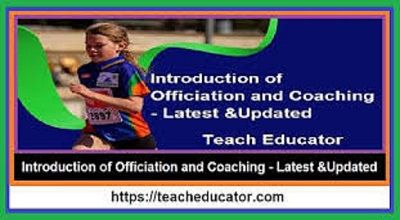Introduction of Officiation and Coaching
Officiation and coaching are integral components of sports and various competitive activities, playing crucial roles in the development, execution, and regulation of athletic events. Both officiating and coaching contribute significantly to the overall success and growth of individual athletes and teams. Let’s explore each concept in more detail:
Officiating:
Definition:
Officiating refers to the act of overseeing and enforcing the rules and regulations of a particular sport or activity during a competition. Officials, also known as referees or umpires, play a vital role in ensuring fair play, maintaining order, and making impartial decisions during matches or games.
Key Responsibilities:
- Rule Enforcement: Officiating involves a thorough understanding and application of the rules governing the sport.
- Fair Play: Officials must ensure that all participants adhere to the principles of fair play, preventing any form of cheating or unsportsmanlike behavior.
- Safety: Officiating also includes responsibility for the safety of the participants and intervening when necessary to prevent injuries.
- Game Management: Managing the flow of the game, timekeeping, and addressing any disputes or conflicts are essential aspects of officiating.
Types of officials:
- Referees/Umpires: enforce rules and make decisions during the game.
- Judges: Evaluate performances in activities like gymnastics or diving.
- Timekeepers: Manage the timing of events.
- Scorekeepers: Record and manage scores.
Coaching:
Definition:
Coaching involves the guidance, instruction, and mentorship provided by a coach to individuals or teams to enhance their skills, performance, and overall development. Coaches play a critical role in motivating athletes, refining techniques, and fostering a positive and growth-oriented environment.
Key Responsibilities:
- Skill Development: Coaches work on improving the technical and tactical skills of athletes.
- Strategic Planning: Developing game strategies and tactics for competitions.
- Motivation: Inspiring and motivating athletes to achieve their best performance.
- Mental Toughness: Helping athletes develop resilience, focus, and mental strength.
- Team Building: Fostering teamwork, communication, and a positive team culture.
Types of Coaches:
- Head Coach: Oversees the entire team and is responsible for overall strategy.
- Assistant Coach: Supports the head coach in various aspects.
- Positional Coach: Focuses on specific positions or skill sets.
- Strength and Conditioning Coach: Works on athletes’ physical fitness.
Summary
In conclusion, officiating ensures the integrity and fairness of competitions, while coaching contributes to the holistic development and performance improvement of athletes. Both are indispensable elements in the world of sports and competitive activities.
